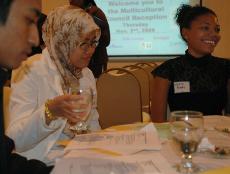Council to promote awareness in students

November 3, 2006
The inception of the Multicultural Council, a group of students from various minority organizations on campus, was celebrated over cake, punch and fruit Thursday night at the Union.
Students representing the different organizations will serve on the new council, which seeks to increase communication between the organizations, and create a more united minority student group.
The Multicultural Council Reception brought together the Illinois Student Senate and Together Encouraging Appreciation of Multiculturalism to create the council. The two groups started the joint venture to create a forum for leaders of various cultural organizations at the University.
Seema Kamath, junior in AHS and cultural and minority student affairs chair for ISS, said the council will create a network between various campus multicultural organizations.
Leaders of these organizations representing eight different multicultural groups will hold bimonthly meetings to discuss issues on campus.
Get The Daily Illini in your inbox!
“The main goal of the minority community is to be more aware of student issues,” Kamath said. “We want to increase the amount of understanding on campus.”
Kamath expressed concern about events like the recent “Tequila and Tacos” exchange between Tri-Delta and ZBT, which she said is evidence of a misinformed student population.
Renee Romano, vice chancellor for student affairs, attended the reception to show support for the Multicultural Council.
She said the University’s diverse student population creates obstacles in fostering an inclusive environment for all students.
“We have challenges and we need to work through them,” Romano said. “The council can be a mechanism for getting input and for educating students. We’re all in this together.”
The council will work in conjunction with University administrators, like Romano, to bring together the wide range of groups, including the African Cultural Organization and the National Organization for Women.
Many resources are available to these campus organizations, and Kamath said the council can help the leaders gain access to them.
“Our ultimate goal is to create an educated public,” Kamath said. “This is one small step towards that.”






